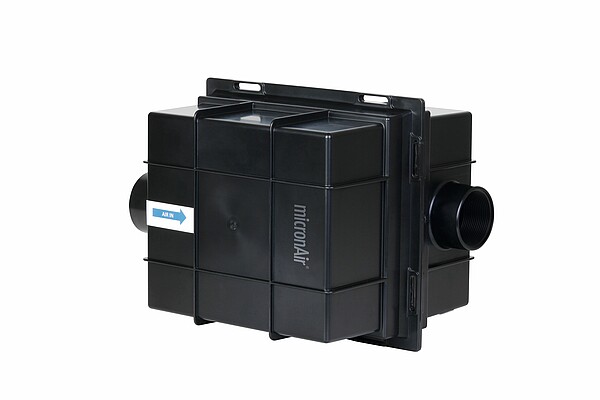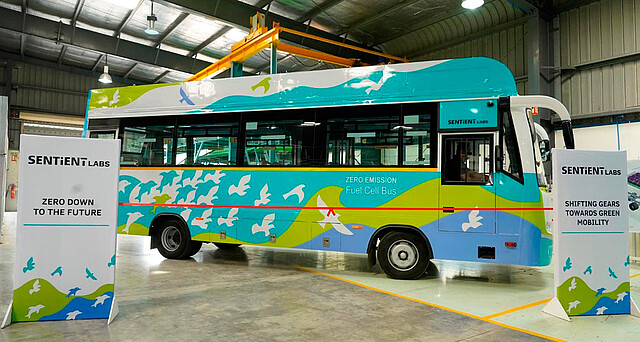Freudenberg supports India’s first zero-emission bus with fuel cell filters
Fuel cell filter for first Indian-designed and -built fuel cell public transport bus
This bus runs on hydrogen: Freudenberg client Sentient Labs recently introduced the first zero-emission bus designed and built in India. The company relies on micronAir filters to keep the fuel cells running despite tough weather conditions and exposure to pollutants such as ammonia. Thanks to the hydrogen technology, the model bus can run for up to 600 kilometers before needing to refuel.
Hydrogen fuel cells have become a viable alternative to conventional combustion engines for vehicles that have to cover long distances before needing to be refuelled or recharged. That is why the Research and Development Engineering Lab Sentient Labs developed innovative hydrogen fuel cells in a new commercial bus model intended to cover long distances across India. To ensure the complex technology’s longevity, the company relies on high-tech fuel cell filters from Freudenberg Filtration Technologies.
"Sentient Labs reached out to us during the early stages of their project,” explains Ashok Pandey, Director Automotive, Pharma, Consumer Filter, at Freudenberg in India. “Working closely together, we were able to supply them with the perfect match: a filter that protects the cells, especially from ammonia, but other pollutants such as small dust particles and hazardous gases as well.” Each bus will be equipped with closed “FC F-513-N” fuel cell filters. They ensure that the buses keep running and reduce maintenance efforts. After presenting the first model to the public in December 2021, Sentient Labs is currently looking for clients to bring the bus to roads all over India on a large scale. They additionally plan to utilize the technology for Marine applications.

Protecting fuel cells from outside influences
Life on the road can be tough for a hydrogen fuel cell. To start the chemical reaction, a compressor takes in air from the outside. However, the air is often polluted, containing a mix of sulfur, hydrocarbons, and nitrogen oxides. These pollutants can affect the cell to varying degrees. Some might decrease performance temporarily. Others, such as fine dust, damage the cell permanently, rendering it less effective or decreasing its lifetime. “In the course of the project with Sentient Labs, we took a close look at what kind of outside conditions the vehicles will likely operate in”, says Pandey. “Especially in rural regions, outside air tends to contain high levels of ammonia in addition to other substances. The micronAir fuel cell filter that is now in use is specifically designed to protect cells from ammonia – making the bus the perfect choice for countryside routes.”
The fuel cell filters are part of Freudenberg’s comprehensive portfolio of standardized products and customized solutions for hydrogen fuel cells. The N filters in particular have been recognized as an outstanding innovation by the Baden-Württemberg Ministry for Environment, Climate and Energy and received the f-cell award for innovative fuel cell technology. Different Freudenberg Filtration Technologies filter models can be used in cars, trucks, trains, buses, and stationary applications such as cogeneration and power generation plants.











